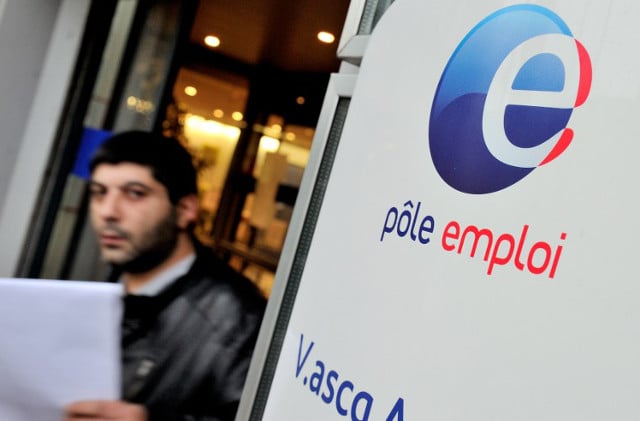
JOBS
Typical French jobseeker paid €1,000 a month in unemployment benefits
France's unemployment benefits are known for being some of the most generous in Europe and while new figures show a few hundred people pick up over €6,000 a month, the average jobseeker is on just over €1,000.
Published: 11 July 2017 14:10 CEST

Photo: AFP
French job seekers are on an average allowance of €1,010 per month, a new study by Unedic, the organisation responsible for running France's unemployment benefits (l'assurance chômage), shows.
Although at the top end of the scale there were several hundred who were being paid €6,500 per month – the highest amount under the system which can pay up to 65 percent of a worker's previous salary..
The report, released on Tuesday, also shows that of the 2.51 million people claiming unemployment benefit in France, there were slightly more female chômeurs (51%) than men (49%).
Among those claiming the chômage, 1.75 million are jobless while 767,000 top up low salaries with the state benefit.
And according to the study, it tends to be women rather than men in this position, with females accounting for 56 percent of claimants who also work.
READ ALSO:

Photo: AFP
The intention behind this topping up system is to encourage people to accept low paid positions while they are on benefits, and naturally claimants taking advantage of the scheme have a slightly higher average income of €1,240, according to the study.
The research by Unedic also showed that around half of the people claiming unemployment benefits in France have recently come out of a temporary job contract (known as a CDD in France).
In France, the majority of recruits are hired on CDD contracts, because they are cheaper, and companies are wary about handing out CDIs because staff on permanent contracts are harder to let go.
But it leaves many workers in France moving from one CDD to another with little job security. Without a CDI, it is also much harder to get a loan, rent a flat or buy a house.
In addition, Unedic's research showed that among the people claiming benefits more than half didn't have their Baccalaureat – the exams taken by most French 18-year-olds at the end of their time at high school (Lycee).
Around 500 people, which amounts to 0.02 percent of the total number receiving unemployment benefits, receive the maximum amount of benefits per month at €6,500. These are mostly those falling into the cadres employment category, meaning managers and executives, who will have been earning high wages.
Most workers are on much lower wages (€2,100 for men and €1,680 for women) so their benefits are much lower.
In 2016, The Local reported on the report by France's top auditors saying the country's jobless benefits needed cutting urgently and highlighted the maximum allowance – then €6,200 a month.
And while the benefits system in France may sound very generous compared to its UK and US counterparts, the French are generally on a par with or even below some of its European neighbours according to several key benefit criteria which were assessed by L'Express in 2014.
In 2014, The Local looked at these criteria which showed that in terms of eligibility, French workers need to have worked the equivalent of four months in the past 28 months in order to be able to claim unemployment benefits.
France is among the most generous in Europe when it comes to how long people can claim unemployment benefit. In France it's possible to receive unemployment benefits for up to two years, although if you are over 50 that period grows to three years, although under the principle of “one day worked, one day covered” some 41 percent of unemployed people qualify for the maximum duration.
In May, The Local reported that France's jobless rate had fallen to below 10 percent for the first time since 2012.
Url copied to clipboard!


 Please whitelist us to continue reading.
Please whitelist us to continue reading.
Member comments